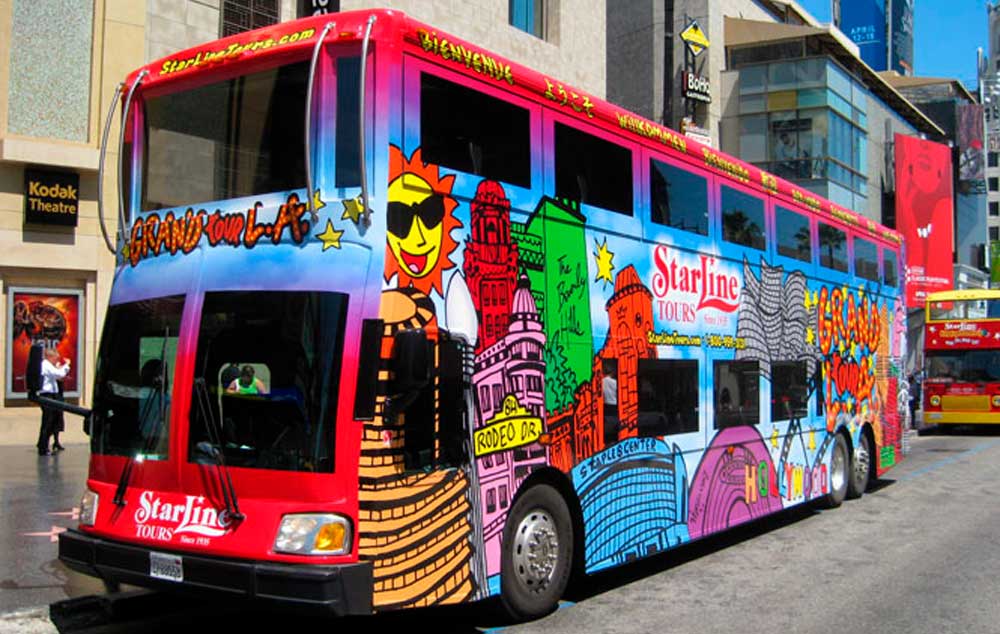
Hollywood tour operator settles disability lawsuit
Amy Champlin simply wanted the classic Los Angeles experience: to gawk at movie stars’ homes, the Hollywood Walk of Fame and the Sunset Strip from the comfort of a tour bus.
What she got instead was an eight-month ordeal to get a reservation, a six-hour wait for a tour that never took off and a part in a federal lawsuit. The glitch: Starline Tours couldn’t provide a working wheelchair-accessible bus for Champlin and her group, who were in town for a National Ataxia Foundation meeting.
On Monday, federal prosecutors in Los Angeles announced a consent decree with Starline, which bills itself as the largest and oldest of the Hollywood-centric tours. To settle an Americans With Disabilities Act lawsuit brought by the U.S. attorney, the company agreed to ensure that enough of its buses are wheelchair-accessible and to train its employees.
Assistant U.S. Atty. Robyn-Marie Lyon Monteleone, who filed the suit, said the problem went beyond Starline and that people with disabilities often have trouble finding any tour that’s accessible to them, even after contacting several companies. The office has received complaints about at least three other tour operators, she said.
Monteleone said she hoped the decree would send a message to the other companies.
“This was the big L.A. trip of their lifetime; many of them thought they may never be well enough to come out again,” she said of Champlin and her group, who suffer from ataxia, a degenerative disease. “To them, it was a really big deal.”
According to the decree, only 25 of the 90 vehicles Starline currently operates are wheelchair-accessible. The company did not admit liability or violation of the disabilities act. It agreed to pay a fine of $5,000, and $15,000 in compensation for Champlin and her group.
Champlin suffers from Friedreich’s ataxia, a hereditary disease that causes impaired muscle coordination that worsens over time, for which she uses an electric wheelchair. According to the suit, her quest for a tour began when she called the company eight months before her March 2011 visit.
She was initially told that Starline could only accommodate tourists who could walk onto the bus on their own and collapse their wheelchairs. After some wrangling, during which Champlin referred the company to disabilities act requirements, she and others attending the ataxia conference were able to book the 7 1/2-hour “Deluxe Grand City Tour of Los Angeles and Stars’ Homes.”
At 7:30 the morning of the tour, Starline sent a bus that wasn’t wheelchair-accessible. Four hours later, it sent another vehicle — but after the group boarded and secured the wheelchairs, the bus wouldn’t start. The driver explained that the vehicle was rarely used. Champlin and the others waited for an additional two hours for a replacement before giving up on the tour.
Monteleone said the group was refunded the $82-per-person fare and that the company cooperated with the investigation.
Source: Los Angeles Times
Compartilhe
Use os ícones flutuantes na borda lateral esquerda desta página
Siga-nos!
Envolva-se em nosso conteúdo, seus comentários são bem-vindos!
Artigos relacionados
Teleton AACD. A pessoa com deficiência como protagonista.
Teleton AACD. A pessoa com deficiência como protagonista. Uma iniciativa internacional abraçada pelo SBT no Brasil.
Acessibilidade no ESG. Equipotel aborda o tema para o turismo.
Acessibilidade no ESG, para o mercado do turismo. Equipotel aborda a importância da inclusão da pessoa com deficiência.
Morte Sobre Rodas. Filme inclusivo foi candidato ao Oscar.
Morte Sobre Rodas. Dois protagonistas do filme, são pessoas com deficiência, um usuário de cadeira de rodas e outro com paralisia cerebral.






0 comentários